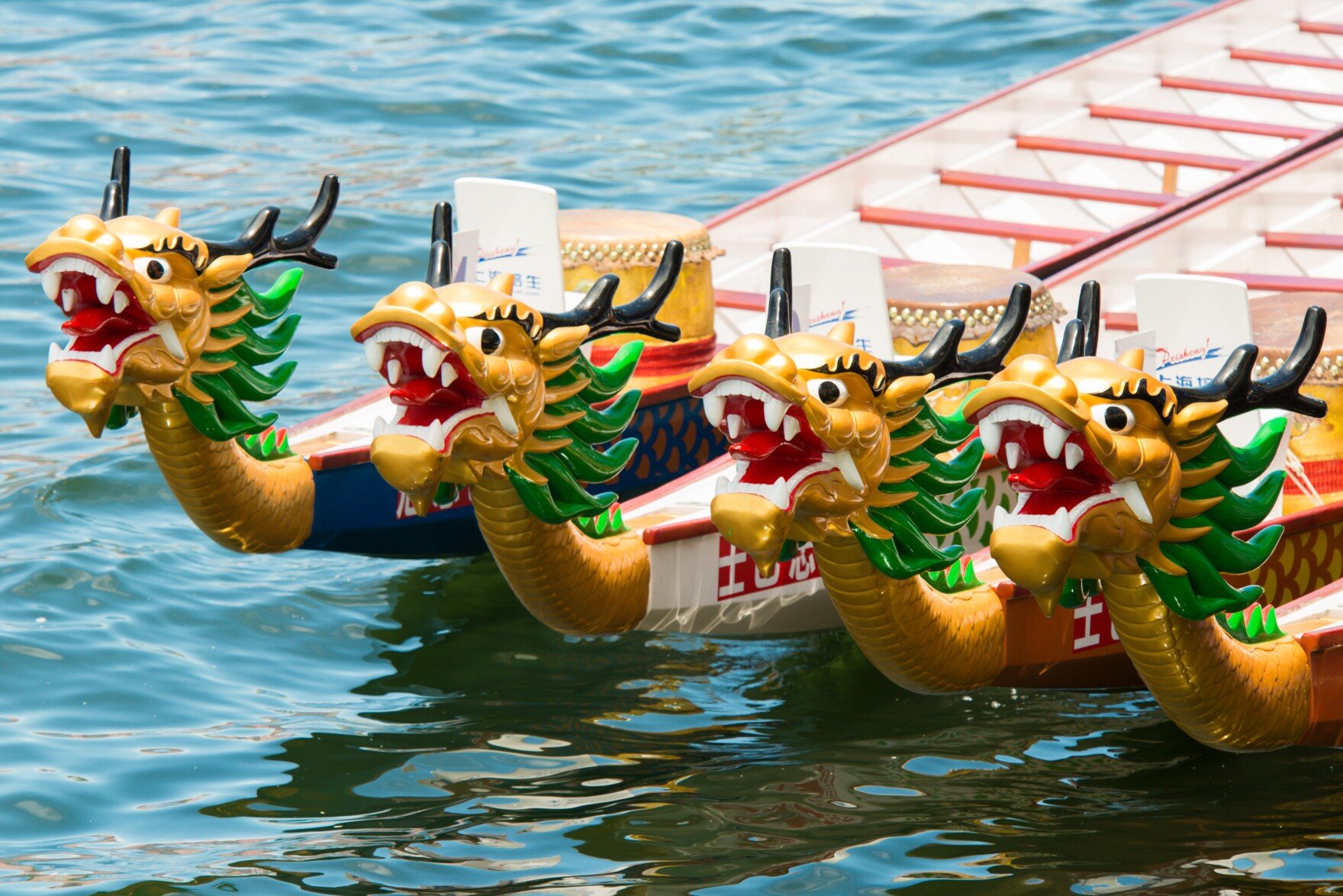A New Challenge (12)
Letting go, a famous Chinese mountain, and the Dragonboat festival
Reading time: 8 minutes.
The summit of Tai Mountain (泰山) in Tai’an, Shandong, China.
The central theme of my departure to China is: letting go – in this particular case the idea that I can control the state of my current accommodation or the weather. This has become clear over the past week as the average daytime temperature rises to 30+ degrees Celsius with a humidity of almost 100%. Never before have I experienced sweat gushing from my body through activities such as breathing or eating, so try to imagine training in those conditions. Because that’s the thing here; except for wind, rain or snow, we are completely at the mercy of the elements. Were our rooms and the dining area last winter often only a few degrees above zero, now the heat lingers wonderfully inside and sometimes I sweat as much at night as during the day. Fortunately, I have hung a cool mosquito net, so there is little sleep-disturbing buzzing around my head.[1]
No more zooming mosquito’s around my head at night :-)
What I need to let go of in the above example is the rather feisty opinion about the lack of climate regulation in our training facilities, and where one shouldn’t have to defend against continuous attacks of mosquitoes and horseflies when I am just trying to balance on one leg. The experience in the Netherlands is radically different and because that is my only point of reference, I need time to get used to circumstances I couldn’t have predicted. But once the opinion is let go of, we just respond as well as possible to the circumstances as they present themselves in order to be able to train, read, study, and write. The energy which is not wasted on frustration processes, is now available with which we can enjoy the rich flora and fauna of this area, from the most colourful lizards to frogs the size of a cat, and a beneficence of greenery I haven’t experienced in this way before.
Another deeply rooted opinion is that in these conditions I ought to train with the same intensity as during milder temperatures in spring and late summer/autumn, and if that fails, I have failed. Of course that’s utter nonsense, but our collective sense of guilt institutionalized by the Roman Catholics and Calvin is still doing a mighty fine job here and if it were not for my reasonably developed body awareness, I would have crossed my boundaries much more often.
All that ballast from the past reminds me of a funny picture of a middle-aged man who is weighed down by the weight of a very large, stuffed bag that he carries on his back. There is a label on the bag that says: ‘the past,’ while a child looks up at him and asks:
“Wouldn't it be easier if you left that behind?”
Well, we carry the past with us and I am no exception. Only at 32 was the encountered dead-end severe enough to open a door, by means of which I was finally enabled to begin asking critical questions about my thought and behaviour patterns, because I was not exactly satisfied with a number of them. That created opportunities to experiment, which is to say looking for new and unknown situations with the aim of seeing what is happening and how I react to those new situations – knowing that the familiar old situations will inevitably return if I won’t move. The experiences gained as a result formed the basis to finally detach from the infantile and widespread desire to continue to make someone else responsible for my existence; infantile because the desire comes from my inner children who are activated as soon as my buttons are pushed, and widespread because virtually everyone looks toward someone else for his or her security and happiness under the motto: ‘if I do what you want, then you take care of me.’ That might be a lot of things, but it’s not freedom.
Despite the fact that the beginning of the path to self-inquiry began more than 18 years ago, only after my divorce in 2020 dawned the realization that all my life I had made myself dependent. Unconsciously I had made others responsible for making sure that everything I thought I needed was there; from praise and unconditional love to food and sex. Every time I said, “I love you,” I actually meant, “here are my problems, please solve them for me, and then I will solve your problems for you.” But I never realized that.
Naturally that is a dead end, but one that is irrevocably cultivated and maintained by our culture; it teaches us all kinds of trivia we call ‘knowledge’, but nowhere can we learn how to find out who we are and what suits us as a unique organism. So we hardly get the opportunity to really experience what suits us and in the vast majority of cases we adapt to the wishes of others; starting with parents, then the teacher, manager, boss, president, and country. Subsequently we delude ourselves into believing that situation to be desirable, until we run into the walls of our self-made prison. Then there are two possibilities: Either we break out, or we resign. In the last case we quite literally stop living.
Breaking out from our self-made prison. Illustration: barokahselalu777
The divorce marks breaking out for me, but actually divorces take place all the time. In order to grow and develop as a human being, we have to divorce ourselves from our parents and from all those people we place on a pedestal. That doesn’t mean we do not love them anymore, on the contrary; I believe our love to be much more sincere after we have divorced, because then we can make a truly free choice to love, instead of feeling one ought to love because that’s what’s expected.
But above all, we have to divorce ourselves from the conviction that our personal frame of reference, which consists of that tangle of ideas, beliefs, opinions, biases, and whatever else, is the only truth. Looking back, it can be said that the divorce with my ex was just a materialized version of a whole string of necessary divorces in order to truly develop into a complete and free person. Among other things, it created space to experience what suits me as a unique organism, of which, for example, the art of massage became a manifestation.
It also gave the courage to temporarily give up everything and travel to China to learn tai chi. This adventure is extraordinary, precisely because I don't know where the journey will lead when I end the year’s training. I now consciously want to experience that uncertainty to find out where and when my fears arise, because as long as there’s still anxiety, I cannot move freely; and not knowing where I can spend the night seems to be an anxiety that still needs to be overcome.
In addition, I am currently doing a second, somewhat smaller, renunciation-experiment. Recently, I have noticed falling back into distracting behaviour by visiting YouTube, news and music websites when, for example, writing a blogpost goes awry. The experiment consists in that I do not consume online content until July 14th. Each time the tendency comes up to do so anyway, I make a note of the circumstances and answer The Five Questions for Self-examination. I learned about the renunciation-experiment method from Erich Fromm and will be discussed in more detail in a separate article.
Two weeks ago a friend and I visited the most important sacred mountain in China: Tai Mountain (泰山 – tài shān). The 9-kilometer ascend overcomes a height difference of 1395 meters and is climbed by stone stairs with a total of 7200 steps. We started the ascend around 9 AM and it was an extraordinary spectacle: very old stairs, stunning nature, and the most beautiful Taoist and Buddhist temples that were interspersed with a multitude of eateries and souvenir stands with the most corny mountain-related mess for tourists you can imagine.

















Despite the Disneyland-like scenes, there were still many Chinese on the mountain for a pilgrimage. A man in his 70s, perhaps already 80s, whom we met in one of the mountain temples, made a great impression. He had a stick with him that was part of a ritual: every time he took a step forward, he placed the stick on the ground in front of him, then knelt behind the stick and bowed several times. Then he got up, picked up the stick, took a step, put the stick down again, and sat back on his knees behind the stick to bow. He did so until the entrance to the temple was reached, which he entered to pay homage to the present statue. And when we were descending many hours later, we came across him again, still quietly paving his way up.
The temples on the top and the view from there were breath-taking. Of the sacred mountains, Tai Mountain is the most important and many Chinese emperors performed religious rituals in the temples on the mountain. The word ‘tai’ (泰) means ‘peace’ and’ ‘stability’ in Chinese and it was believed that if Tai Mountain was stable, stability reigned throughout the country.
The end of the descend was unexpected because the lower we got, the more people went in the opposite direction up the mountain – despite the fact that it was already getting dark and the path was barely lit. Then we learned that the sunrise is called one of the four natural wonders of the mountain. With a night temperature of around 20 degrees Celcius, it was easy to imagine that many wouldn’t mind a few mosquito bites to witness such a miracle.
Another typical Chinese festival I visited last month was the Dragonboat festival. There are several origin stories, but in a generally accepted story, the origin seems to be related to the beginning of the fifth month on the lunar calendar, which is known as the poison month. At the beginning of the hot summer, people quickly fell ill and there were often epidemics. The people called that month a bad month in which diseases had to be prevented and evil spirits driven away. The Dragonboat festival was therefore originally a traditional medical and health festival in which people fought against diseases and poisonous insects, but the legend of the Chinese poet Qu Yuan perhaps speaks more to the imagination.





Finally, our Australian fellow student is out of hospital and resumed her training (see Part 11). After being pulled inside-out and upside-down in the medical circus, all her vital functions and organs turned out to be working fine and the final diagnosis was: ‘a perfect storm caused by an unusual combination of external conditions,’ namely: from sub-zero temperatures in Australia to 30+ degrees Celsius here in China; long flights; change of diet; contracting a minor heatstroke during her second day in China. After she was given diuretics in the hospital, within two days she lost the nine kilos she had gained in three days the week before due to extreme acute fluid retention. Glad to have her back safe and sound!
Jolly greetings,
Erik Stout
[1] Though the crickets and frogs give phenomenal concerts that seem to go on all night. Fortunately, they seem to promote sleep rather than the other way around.
P.S. The pictures in the Dragonboat Race Gallery are taken from the following sources respectively:
sportswave.ca, shine.cn, wuwm.com, magx.com, lansingstatejournal.com.






